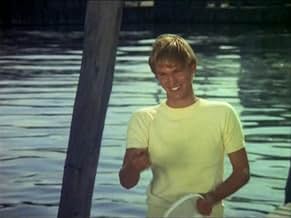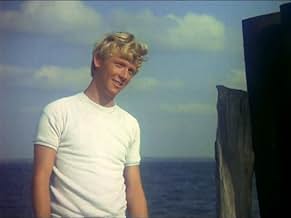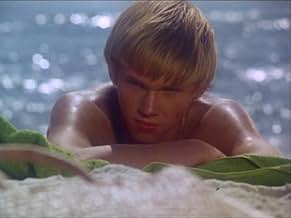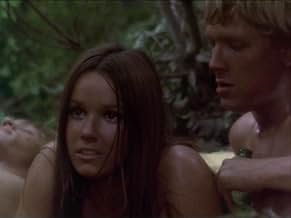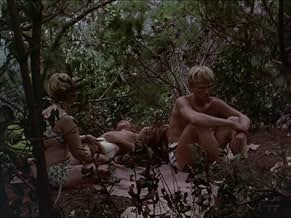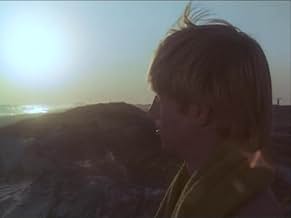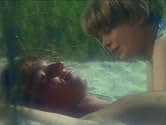NOTE IMDb
6,9/10
2,3 k
MA NOTE
Ajouter une intrigue dans votre langueDuring summer vacation on Fire Island, three young people become very close. When an uncool girl tries to infiltrate the trio's newly-found relationship, they construct an elaborate plot tha... Tout lireDuring summer vacation on Fire Island, three young people become very close. When an uncool girl tries to infiltrate the trio's newly-found relationship, they construct an elaborate plot that has violent results.During summer vacation on Fire Island, three young people become very close. When an uncool girl tries to infiltrate the trio's newly-found relationship, they construct an elaborate plot that has violent results.
- Réalisation
- Scénario
- Casting principal
- Nommé pour 1 Oscar
- 4 victoires et 4 nominations au total
Conrad Bain
- Sidney
- (non crédité)
Andrew Krance
- Town Hood
- (non crédité)
Eileen Letchworth
- Dan's Mother
- (non crédité)
Wayne Mayer
- Town Hood
- (non crédité)
Maeve McGuire
- Younger Woman
- (non crédité)
Ed Stevlingson
- Sidney
- (non crédité)
Peter Turgeon
- Mr. Caudell
- (non crédité)
Ralph Waite
- Peter's Father
- (non crédité)
Lydia Wilen
- Waitress
- (non crédité)
Avis à la une
Last Summer is a movie that you'll want to see alone, or with someone you fully trust. The plot is well-captured prior to my review, and it's truly not difficult to understand the story.
Rarely, a movie captures my interest from start to finish, and Last Summer happens to be in this category. Aesthetically, the movie was beautiful to see. The golden, hazy effects of the camera work, along with the beautiful colors of the sea and even the hues of each character's eyes were all visually stunning. As a fan of the 1970s, it is easy to see how this movie captures the era perfectly (even if it's from 1969).
The main standout, however, is the discomfort I felt from early in the movie, until the very end. If you are a sensitive person, the increasingly awkward and eventually deplorable situations will be hard to view. The bird injury and 'operation', the reception of Rhoda into the group, the treatment of Anibal, and the final scenes of the seagull and Rhoda - will likely conjure the thought of "how did this movie get into normal theaters?".
Themes of narcissism, animals as property, people as property, justice, and the polarity between morality and acceptance all stood out. The characters are a combination of affable and deplorable. It's interesting to see how they shift: initially, we all feel a little annoyed by Rhoda, but eventually, she becomes the person you'd most want to befriend (at least in my mind). She is the person you want your daughter to be, with exception of how she is treated. We also feel charmed by the sweetness of the two teen boys initially, which morphs into a loathing.
It was also interesting to see that every genuine sentiment displayed in this movie - guilt, compassion, joy, and justice - was bestowed upon the seagull. Rather than experiencing the unpleasantness of acknowledging their emotions, Sandy, Peter and Dan would prevent that by turning to fits of laughter instead.
While it is repetitive to comment on this, I can't help lauding the amazing talent of Catherine Burns. She truly had a gift for becoming a character, and stirring the hearts of even the most disconnected viewer. It's a tragic loss that she did not pursue additional acting, and also that she passed away at 73.
A minor observation: Barbara Hershey was unrecognizable to me; I appreciated that her character was a naturally beautiful young woman who seemed comfortable in her own skin. This same actress portrayed a mother of two young women with eating disorders in 2003 ("Hunger Point"), but in this movie, there is an appreciable amount of body-positivity that begins with her character.
Rarely, a movie captures my interest from start to finish, and Last Summer happens to be in this category. Aesthetically, the movie was beautiful to see. The golden, hazy effects of the camera work, along with the beautiful colors of the sea and even the hues of each character's eyes were all visually stunning. As a fan of the 1970s, it is easy to see how this movie captures the era perfectly (even if it's from 1969).
The main standout, however, is the discomfort I felt from early in the movie, until the very end. If you are a sensitive person, the increasingly awkward and eventually deplorable situations will be hard to view. The bird injury and 'operation', the reception of Rhoda into the group, the treatment of Anibal, and the final scenes of the seagull and Rhoda - will likely conjure the thought of "how did this movie get into normal theaters?".
Themes of narcissism, animals as property, people as property, justice, and the polarity between morality and acceptance all stood out. The characters are a combination of affable and deplorable. It's interesting to see how they shift: initially, we all feel a little annoyed by Rhoda, but eventually, she becomes the person you'd most want to befriend (at least in my mind). She is the person you want your daughter to be, with exception of how she is treated. We also feel charmed by the sweetness of the two teen boys initially, which morphs into a loathing.
It was also interesting to see that every genuine sentiment displayed in this movie - guilt, compassion, joy, and justice - was bestowed upon the seagull. Rather than experiencing the unpleasantness of acknowledging their emotions, Sandy, Peter and Dan would prevent that by turning to fits of laughter instead.
While it is repetitive to comment on this, I can't help lauding the amazing talent of Catherine Burns. She truly had a gift for becoming a character, and stirring the hearts of even the most disconnected viewer. It's a tragic loss that she did not pursue additional acting, and also that she passed away at 73.
A minor observation: Barbara Hershey was unrecognizable to me; I appreciated that her character was a naturally beautiful young woman who seemed comfortable in her own skin. This same actress portrayed a mother of two young women with eating disorders in 2003 ("Hunger Point"), but in this movie, there is an appreciable amount of body-positivity that begins with her character.
I had the pleasure (if not outright fun), together with several of my friends at Fire Island Ferries, of participating in the production of this film. It was a fairly compelling and accurate portrayal of the late-60's counter-culture. Fire Island was certainly THE place to be during those summers.
Post-production, we were given the opportunity to preview it at a local theater. It quickly received an "X" rating due the explicit "rape scene" which was abridged to earn the "R" it carried when released. I wonder what circulation it got before the editing and re-rating. Are there any copies of the original ?
Post-production, we were given the opportunity to preview it at a local theater. It quickly received an "X" rating due the explicit "rape scene" which was abridged to earn the "R" it carried when released. I wonder what circulation it got before the editing and re-rating. Are there any copies of the original ?
It's almost surreal. I think this film can be viewed on a few levels.
If you are looking for a profound coming of age film ..this is not it. There is however a provocative image here and if you adjust your vision you might just possibly see...yourself..at an age of no regrets and all intoxications.
The " three " set up the world for themselves and no one else can be allowed in to spoil It That is until Catherine Burns comes along and throws a wrench in their postulates on life..
There is a scene where the "three" are running along the beach...look closely now ..closer ..did you find someone you know well or someone you used to know.
Provocative and wonderful and melancholy all at the same time.
CP
If you are looking for a profound coming of age film ..this is not it. There is however a provocative image here and if you adjust your vision you might just possibly see...yourself..at an age of no regrets and all intoxications.
The " three " set up the world for themselves and no one else can be allowed in to spoil It That is until Catherine Burns comes along and throws a wrench in their postulates on life..
There is a scene where the "three" are running along the beach...look closely now ..closer ..did you find someone you know well or someone you used to know.
Provocative and wonderful and melancholy all at the same time.
CP
You must see it uncut for the full effect. The conclusion at the beach is the whole point of the film, as Evan Hunter points out in his interview in "The Writer". I was agast the first time I saw it on commercial TV (late night).
I caught this film late at night and stayed up until 4am watching it. It is a beautifully crafted story and intriguing to watch Barbara Hershey, Richard Thomas, and Bruce Davidson give such strong performances at the start of their careers. Catherine Burns, however, steals the film as Rhoda. Her performance is nothing short of screen perfection and should be required viewing for every actor. She gives a monologue about her mother's death that will leave you feeling as alone as she is.
Le saviez-vous
- AnecdotesFeature-film debut of Catherine Burns, in a role that would earn her an Oscar® nomination as Best Actress in a Supporting Role.
- GaffesAfter the guys meet Sandy, when they take the thing out of the bird's beak, Sandy's hair changes its position considerably between takes.
- Crédits fousThere are no opening credits beyond the noting of the film's producer (Emanuel L/Wolf) and distributor (Allied Artists). The film's title, cast, and production credits only appear at the end.
- Versions alternativesOriginally rated X when it was first released in 1969. Cuts were later made to a graphic rape scene at the end of the film, and the MPAA gave it a R-rating. This latter version is the only one currently available on video.
- ConnexionsFeatured in Indie Sex: Teens (2007)
Meilleurs choix
Connectez-vous pour évaluer et suivre la liste de favoris afin de recevoir des recommandations personnalisées
- How long is Last Summer?Alimenté par Alexa
Détails
Box-office
- Budget
- 780 000 $US (estimé)
- Durée1 heure 35 minutes
- Mixage
- Rapport de forme
- 1.85 : 1
Contribuer à cette page
Suggérer une modification ou ajouter du contenu manquant

Lacune principale
By what name was Dernier été (1969) officially released in India in English?
Répondre

